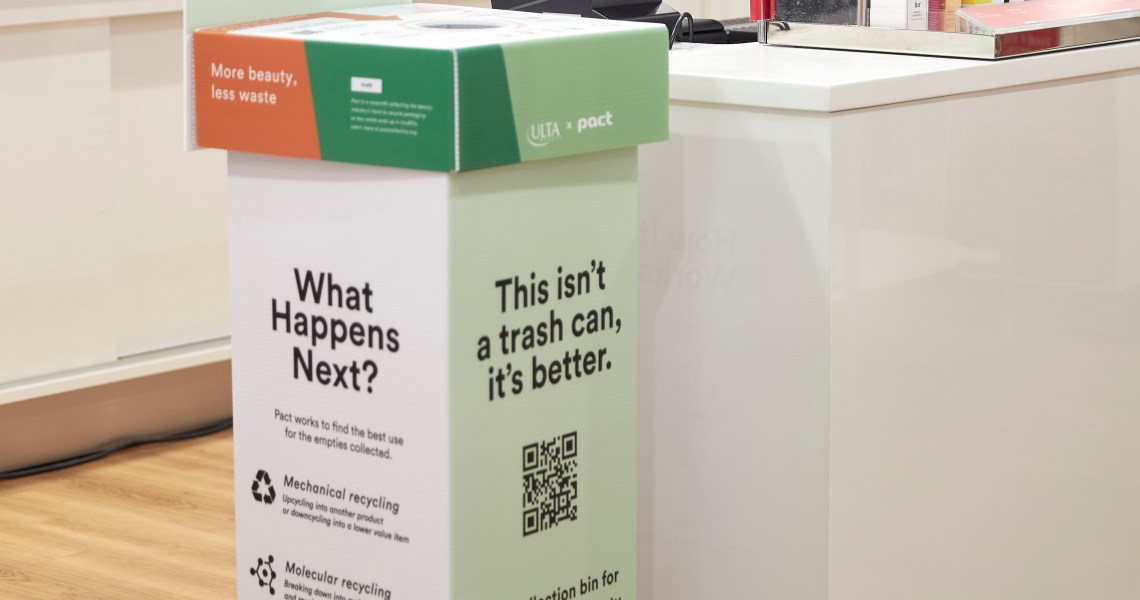In collaboration with the packaging waste solutions non-profit Pact Collective, as of Monday, Ulta Beauty has rolled out an expansion of its in-store take-back initiative to its more than 1,350 U.S. stores. The company and Pact first piloted the program, dubbed Beauty Drop-Off, in 2023. At the time, take-back services were introduced in 90 of its stores.
Beauty product packaging most often ends up in landfills, and Ulta believes the new access to its take-back program will help customers shift their habits.
“Today’s consumers are more conscious about the beauty products they use and making sure they make guided choices about their impact on the planet,” said Kristin Wolf, Ulta Beauty’s svp of enterprise strategy and transformation. “This initiative gives our customers a seamless and responsible solution to discard their empty packaging, as well as their hard-to-recycle empty packaging.”
According to experts, the complexity of beauty packaging recycling has to do with the colors and types of plastics used, among other factors.
The expansion of Beauty Drop-Off places collection bins where customers can deposit their beauty product empties in all Ulta stores. These items are then processed by Pact Collective through methods including upcycling, downcycling, molecular recycling and waste-to-energy conversion. These bins not only facilitate recycling, but they also educate customers about the environmental impact of their disposal choices through visuals and information on their exterior. Customers can use the drop-off for free. The retailer is marketing the Beauty Drop-Off expansion through in-store displays, emails and social posts. Representatives declined to disclose the cost of the program.
Around half of the brands featured in Ulta Beauty’s assortment are part of its Conscious Beauty program, which mandates adherence to at least one of five pillars: clean ingredients, cruelty-free practices, vegan products, sustainable packaging or making a positive impact. Since its inception in 2020, the Conscious Beauty program has seen a 14% increase in certifications annually, as detailed in Ulta’s 2022 ESG report from April 2023.
“It takes a portfolio of approaches to address the [beauty packaging] issue, and there is not one silver bullet answer,” said Wolf. “Most people aren’t aware that beauty packaging [elements] that are typically smaller than the size of a fist, like the pumps and the spray tops, are not curbside recyclable. So when people throw them in their home recycling bin, they go straight to the landfill.”
On March 14, Ulta reported a net sales increase of 10.2% year-over-year to $3.6 billion for the fourth quarter of 2023.
According to data insights from Ulta Beauty, over 86% of its customers, including 90% of Gen-Z and younger-millennial customers, are interested in purchasing clean and consciously-made beauty products. In addition, 64% of customers are interested in recycling empties in-store. To meet the growing demand, the company has introduced over 300 certified brands within its Conscious Beauty assortment.
“By 2025, 50% of our assortment of products will be recyclable, refillable, or made from recycled or bio-sourced materials,” said Wolf. Wolf is aware that plastic regulations in the U.S. will most likely end up affecting the beauty brands Ulta stocks, as well. “The regulations in this space are always advancing, and our teams are on top of those and monitoring them, thinking about the implications for us and our brand partners,” she said.
In addition, Ulta Beauty works with compliance platform Novi Connect to verify Conscious Beauty brands and products as they enter its assortment. This also aids the company in providing brand partners with resources and emerging solutions for ensuring conscious packaging and formulations.
Ulta also works with an advisory council that it announced in 2022 to help brands deliver on their sustainability commitments across formulations, marketing and packaging. Members include Loren Lucree, svp of global innovation at Unilever; Nils Johnson, founder of Good Molecules; and Annie Jackson, founder of Credo.
“We continue to engage with the council to guide and shape our program and its standards,” said Wolf. “They also help us stay on top of regulations and understand the viewpoint of brand partners, which are incredibly important as we shape this [Conscious Beauty] program.”
Other beauty brands and companies that have partnered with Pact include Sephora, Fenty Beauty and Ilia. Sephora hasrolled it out to 600 stores.




